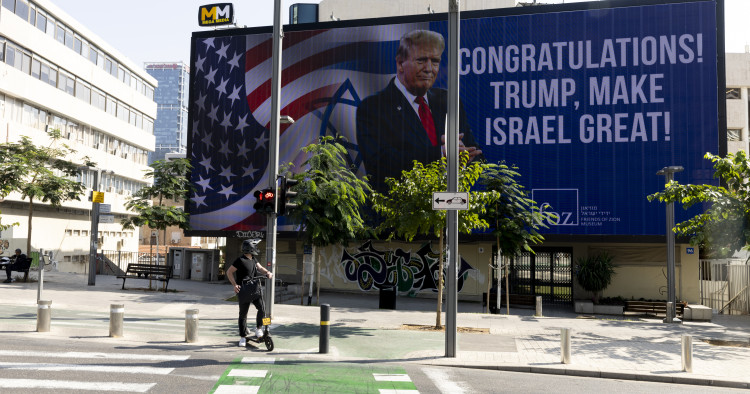Contents:
- Israeli government celebrates Trump’s victory amid its concerns about Biden’s final policy moves
- Palestinians fear incoming Trump administration will not stop ethnic cleansing in Gaza and annexation in the West Bank
- Tehran mulls reengagement with US
- Gulf leaders balance desire for long-term stability with expectation of uncertainty under Trump
- Turkey’s Erdoğan forgets past, extends welcome to Trump
- Pakistan and Afghanistan looking at bright side of Trump victory
Israeli government celebrates Trump’s victory amid its concerns about Biden’s final policy moves
Nimrod Goren
Senior Fellow for Israeli Affairs

-
President-elect Donald Trump’s victory has been a cause for celebration for Israeli Prime Minister Benjamin Netanyahu and his right-wing allies, but it raises concerns among Israeli liberals.
-
Meanwhile, President Joe Biden’s final policy steps in the White House could focus on reaching a cease-fire in Lebanon, releasing dual US-Israeli citizens held hostage by Hamas, and increasing pressure on Israeli extremists.
Israeli Prime Minister Benjamin Netanyahu was quick to call President-elect Donald Trump to congratulate him for his victory in the Nov. 5 US election and to appoint a new ambassador to Washington — a hard-liner from the settler movement. Throughout his years in office, Netanyahu has shown a clear preference for the Republican Party, often being accused of meddling in US politics and eroding the bipartisan nature of American support for Israel.
Despite reports during President Joe Biden’s term about tensions between Netanyahu and Trump, when the Israeli prime minister visited the US in July 2024, it was obvious that his meeting with Trump was much warmer than the ones he held with Biden and with Vice President Kamala Harris. In the lead up to the US presidential election, Trump utilized his support for Netanyahu in an effort to sway Jewish American voters in his favor, while also seeking to attract Arab Americans by calling for an end to the wars in Gaza and Lebanon.
In Israel, a majority of center- and right-wing voters were polled as favoring a Trump victory, and they celebrated accordingly when he won. Among Israeli liberals, however, there is concern that Trump’s return to power will enable Netanyahu to continue a never-ending war in Gaza, block any future prospects for an Israeli-Palestinian two-state solution, and further undermine democracy and judicial independence.
But before Trump sets foot in the White House, Israeli policy circles are preparing for the Biden administration’s two-month “lame-duck” period. Several previous US presidents have made use of this time to take final steps related to Israel and the region. President Bill Clinton presented parameters for Israeli-Palestinian peace, President Barack Obama declined to veto a United Nations Security Council resolution against Israeli settlements, and, at the end of his first term, Trump announced the normalization of Israeli-Moroccan relations. Questions about whether Biden will follow suit and, if so, what steps he might take are now taking center stage in Jerusalem.
In his post-election address, Biden stated that he will use his final days in office to reach cease-fires in Lebanon and Gaza. He said something similar about Gaza back in July, when he stepped down from the presidential campaign, but nothing happened, leading to doubts in Israel whether this time will be any different.
On Gaza, a cease-fire seems distant. Israel is consolidating its military presence in the coastal strip, paving the way for a new long-term reality in opposition to a hoped-for withdrawal. A hostage release does not seem to be on the horizon either, with new formulas for a small deal rejected, a reported decision by Qatar to withdraw from mediation, and a growing sense in Israel that Netanyahu has given up on the hostages held by Hamas.
Biden could still work to release those hostages who are dual US-Israeli citizens. This was previously considered in Washington but can now be advanced, while efforts are also pursued by others to release two hostages with Russian citizenship. In addition, Biden could take further measures against Israeli extremists, among them Ministers Itamar Ben Gvir and Betzalel Smotrich, and give a tacit green light for international actors to take critical steps against Netanyahu’s policies.
On Lebanon, the prospects for success before Jan. 20 seem higher. There is a convergence of interests, with Biden, Trump, Netanyahu, and Lebanon’s caretaker Prime Minister Najib Mikati all seeking an end to the hostilities. Progress is reportedly being made in talks, led by US special envoy Amos Hochstein, with parallel Israeli efforts underway to involve Russia and contain possible Iranian rejectionism. There is a real chance for success, and Biden should prioritize this and intensify efforts accordingly.
Follow: @GorenNimrod
Palestinians fear incoming Trump administration will not stop ethnic cleansing in Gaza and annexation in the West Bank
Khaled Elgindy
Senior Fellow, Director of Program on Palestine and Palestinian-Israeli Affairs

-
Palestinians have reacted to Donald Trump’s presidential victory with a mixture of indifference and outright trepidation.
-
Under Trump, the United States will, at a minimum, continue to provide unlimited weapons to Israel but without any of the pretense about concern for civilian lives, US law, or international law that prevailed during the Biden administration; yet Trump’s administration may additionally ban UNRWA and back Israeli occupation policies in Gaza and the West Bank.
While Israeli leaders and the public at large reacted to former President Donald Trump’s decisive election victory over Vice President Kamala Harris with jubilation and triumphalism, Palestinians have largely responded with ambivalence. In contrast to Palestinian President Mahmoud Abbas’s strangely upbeat message congratulating Trump, the dominant sentiment among Palestinians has been a mixture of indifference and outright trepidation. On one hand, ordinary Palestinians saw little difference between Harris and Trump as candidates, both of whom pledged to maintain more or less unconditional military and political support for Israel and its war on Gaza. At the same time, however, many understand that the conditions for Palestinians in both Gaza and the West Bank are likely to become materially and significantly worse in the second Trump era.
If nothing else, under Trump, the United States will continue to provide unlimited weapons to Israel but without any of the pretense about concern for civilian lives, US law, or international law that prevailed during the Biden administration. Unlike Joe Biden, who projected occasional displeasure with Benjamin Netanyahu’s government and its conduct in Gaza and the West Bank, the Trump administration is unlikely to object to any Israeli violations on the ground.
There are a number of larger policy changes we can also expect to see in a new Trump administration. Whereas Biden opposed Israel’s attempts to ban the United Nations Relief and Works Agency for Palestine Refugees in the Near East (UNRWA), the UN agency that comprises the backbone of the humanitarian relief effort in Gaza, Trump is likely to join the Israeli government’s efforts to dismantle this body, to which his first administration had already cut funding. Trump is also likely to do away with the Biden administration’s limited sanctions on violent Israeli settlers, which have done little to quell settler terrorism against Palestinians but nonetheless represented an important precedent. Perhaps most crucially, Biden’s vision for post-war Gaza, which calls for a return of the Palestinian Authority, no permanent reoccupation of Gaza, no reduction in its territory, and no forced displacement of Palestinians, will now also become a thing of the past. For these and other reasons, Palestinian civil society leaders have warned of the double threat of ethnic cleansing in Gaza and annexation in the West Bank, both of which are more likely if not imminent after a new Trump administration comes to power in Washington.
Follow: @elgindy_
Tehran mulls reengagement with US
Alex Vatanka
Director of Iran Program and Senior Fellow

-
Numerous Iranian officials, including former senior diplomats, argue Donald Trump’s strong electoral mandate gives him much latitude to cut a mutually advantageous deal with Iran; though, it remains to be seen if such sentiments outlive Trump’s inauguration.
-
Iran has plenty of reasons to want to give negotiations with Trump a chance since it is hurting a lot more today than four years ago, both in terms of the pain of US-led sanctions and major setbacks it faces in the region as a result of Israeli actions against the Iran-led Axis of Resistance.
As Donald Trump prepares to return to the White House, the main question in Tehran is not so much what the incoming American president will do about Iran. Rather, it is about whether Tehran should negotiate with him. Numerous Iranian officials, including former senior diplomats, are making the case that Tehran should not forget it has agency and signal to Trump that Iran is willing to negotiate. According to this view, Trump’s strong mandate following the Nov. 5 elections gives him much latitude to cut a deal with Iran — and one that could be mutually advantageous. It remains to be seen if such calls will shape Tehran’s posture following Trump’s inauguration.
For now, figures close to Supreme Leader Ayatollah Ali Khamenei are indicating a willingness to wait and see what Trump will do in the Middle East and toward Iran before deciding if negotiations with him are possible or not. As Ali Larijani, an advisor to Khamenei, put it, “Trump did not act wisely last time [when he was president]. But he may have gained more experience and might follow a more constructive path [toward Iran].”
To be sure, the Iranians have no fond memories of the first Trump presidential term. From his “Muslim ban” to his “maximum pressure” campaign of sanctions to listing the Islamic Revolutionary Guard Corps (IRGC) as a terrorist entity to his assassination of Qassem Soleimani in 2020, Trump did a lot to unnerve the Iranian government. When in office, Trump always maintained he was willing to talk to Iran but on his terms. Most famously, his administration issued a list of 12 demands in 2018, which Tehran dismissed as a call for its full surrender. Reports that the architect behind the 12-point list, former Secretary of State Mike Pompeo, will not be offered a role in the next Trump administration is the sort of sign Tehran wishes to see: that the president-elect might keep anti-Iran hawks out and provide the grounds for a give-and-take bargain.
In a way, such an accord can be straightforward. Trump’s only ultimatum is that Iran not weaponize its nuclear program. Washington has no intention of toppling the regime in Tehran, according to Brian Hook, Trump’s previous Iran envoy who is set to return in the next administration. Meanwhile, as of today, Khamenei has a ban on nuclear weapons as un-Islamic and, therefore, prohibited.
Reality is, of course, somewhat more complicated. Khamenei’s ban on nuclear weapons was also in place in 2018, when Trump pulled out of the 2015 nuclear deal (the so-called Joint Comprehensive Plan of Action, or JCPOA). Reasons that underpin US-Iranian tensions are rooted in much more than just the fate of Iran’s nuclear program, including the latter country’s controversial regional agenda. But even here there might be some space for compromise. Tehran is hopeful that Trump can force Israel to accept a cease-fire in the wars in Gaza and Lebanon, which could give the Iranians more reason to want to pursue talks with Trump. Still, even in the best of scenarios, the Iranians still need to decide whether they are willing to, in the long run, reconstruct their regional agenda in ways that is more acceptable to the US and its regional partners.
In any event, Khamenei is in a difficult spot. During 2018 and 2019, he repeatedly rejected Trump’s calls for direct talks. But Iran is hurting a lot more today, both in terms of the pain of US-led sanctions and major setbacks it faces in the region as a result of Israeli actions against the Iran-led Axis of Resistance. Consequently, Tehran has plenty of reasons to want to give negotiations with Trump a chance, even though such talks may be hugely awkward and uncertain.
Follow: @AlexVatanka
Gulf leaders balance desire for long-term stability with expectation of uncertainty under Trump
Ibrahim Al-Assil
Senior Fellow

-
Based on experience, Gulf leaders appreciate Donald Trump’s style but anticipate uncertainty as a result of his inconsistent policy choices.
-
Prioritizing diplomacy and avoiding military escalation, Gulf states support the two-state solution for the Israeli-Palestinian conflict and seek a balanced partnership with the United States, aiming for deeper strategic ties with the US and Israel while ensuring their own security and economic interests are safeguarded.
With Donald Trump’s victory in the November 2024 election and the Republican Party’s trifecta control over both houses of Congress and the White House, Gulf countries are adopting a pragmatic approach, balancing a desire to continue the personal relationships they have cultivated with him against concerns about his unpredictable style and the lack of an American long-term strategic vision and commitment. Regional leaders also have developed their own approaches to conflicts in the Middle East over the last few years that they hope the Trump administration will support rather than complicate.
Gulf leaders, particularly those from Saudi Arabia and the United Arab Emirates, have long appreciated Trump’s direct, transactional approach to foreign policy. His tendency to conduct business-like relationships with his counterparts has allowed leaders in the Gulf to feel they share a mutual understanding. This personalized diplomacy resonates with Gulf leaders, as they believe they can navigate complex issues with a president who values relationships over bureaucratic norms.
However, Gulf countries also have lingering concerns from Trump’s first term. His inconsistent approach to governing and his administration’s failure to respond to the 2019 Abqaiq-Khurais attack by the Houthis, which damaged Saudi oil infrastructure and raised tensions with Iran, made many in the region realize that the United States’ long-term commitment to their security is in question, regardless of whether Republicans or Democrats hold power.
The Gulf states are firm in their desire to avoid a direct confrontation with Iran. This was clearly reflected in the closing statement of the Extraordinary Arab and Islamic Summit, hosted by Saudi Arabia on Nov. 11, 2024, in which leaders called for respect for Iranian sovereignty and signaled their preference for diplomacy over military escalation.
Another important issue for Gulf countries is the Israeli-Palestinian conflict. While Gulf leaders have maintained relationships with Israel, particularly following the Abraham Accords drawn up by the first Trump administration, they still support a two-state solution as the foundation for lasting peace. Trump’s approach to this issue, particularly his close ties with Israeli Prime Minister Benjamin Netanyahu and his first administration’s attempts to alter the two-state framework of negotiations, are viewed with some wariness. This is a critical point on which Gulf leaders seek alignment with the US but also wish to assert their position in support of a balanced peace process.
While Gulf countries are likely to continue fostering their relationships with the US under Trump’s leadership, they are taking steps to ensure that their own security, economic interests, and long-term strategic goals are safeguarded. Their preference for a balanced, reliable partnership is likely to remain a key priority, while they keep a careful eye on the potential consequences of Trump’s foreign policy decisions. The Gulf states seek deeper strategic and military partnerships with the US, but they also want stability and long-term planning, something that Trump’s more unpredictable approach may not guarantee.
Follow: @IbrahimAlAssil
Turkey’s Erdoğan forgets past, extends welcome to Trump
Gönül Tol
Director of Turkey Program and Senior Fellow, Black Sea Program

-
After Donald Trump’s election victory on Nov. 5, Turkish President Recep Tayyip Erdoğan called the US president-elect a “friend” and invited him for a visit.
-
Yet Trump’s policies during his first term — including on Syria, international trade, and the Eastern Mediterranean — may bode ill for the US-Turkey relationship come January.
Since President-elect Donald Trump first came onto the political scene in 2015, Turkish President Recep Tayyip Erdoğan has been one of his biggest fans. After Trump’s second election victory on Nov. 5, Erdoğan called him a “friend,” welcomed his return to the White House, and invited him to visit Turkey. The Turkish leader apparently is not alone. According to a poll conducted in October, a plurality of Turks favored Trump over Vice President Kamala Harris. But Trump’s track record during his first term does not quite bear out such enthusiasm, and his second presidency could produce even bigger challenges.
Trump’s first presidential election victory, in 2016, was welcome news in Turkey, where anti-American sentiment had peaked due to outgoing President Barack Obama’s policies on Syria. From Washington’s point of view, Turkey, though an important North Atlantic Treaty Organization (NATO) ally, was not only dragging its feet in joining the fight against the Islamic State (ISIS) but also turning a blind eye to the jihadist group’s operations within its own borders. Ankara, on the other hand, was frustrated that the Obama administration was arming its arch-enemy, the Syrian branch of the Kurdistan Workers’ Party (PKK), which had become a US partner in the fight against ISIS.
While Trump’s electoral win in 2016 promised to turn a new page in bilateral ties, it failed to solve existing problems and created a whole host of new ones. Trump pushed for a closer alliance between Greece, Cyprus, and Israel, culminating in the passage of the Eastern Mediterranean Security and Energy Partnership Act of 2019 (East Med Act). The US-led cooperation among these countries undermined Turkey’s perceived interests in the region. Trump’s own Syria policy then dealt the US-Turkey relationship a new blow — his administration imposed sanctions on Turkish government agencies and officials in retaliation for Turkey’s incursion into Syria, an invasion that Ankara believed he himself had cleared the way for by withdrawing American troops. Moreover, Trump halted negotiations over a $100 billion trade deal and doubled tariffs on imports of Turkish steel, thrusting Turkey into a full-blown currency crisis. Finally, Trump personally humiliated Erdoğan by writing him a letter in which he warned the Turkish strongman against an incursion into Syria, telling him not to be a “fool” and threatening to “obliterate” his economy.
Trump’s second presidency could pose further challenges for Ankara. Sen. Marco Rubio, reportedly Trump’s pick for secretary of state, was one of the co-authors of the 2019 East Med Act and is known to be a hawk on China and Iran. The Greek-Cypriot-Israeli relationship is likely to continue to grow in the coming years, hardly good news for Turkey’s Eastern Mediterranean policy. And if the new Trump administration again pursues a policy of maximum pressure on Iran, Turkey, a close trade and energy partner of Iran, could find itself in a difficult spot. A tougher US approach toward China could also make Ankara uncomfortable. Turkey signed a memorandum of understanding (MoU) with Chinese giant Huawei to collaborate on the development of the fifth-generation technology standard for broadband cellular networks (5G) in Turkey. For Trump, the competition for 5G deployment is essentially a two-horse race between the US and China, and the returning US president is dedicated to an American win. Another potential flashpoint in US-Turkey ties is critical minerals. Turkey is collaborating with China on that front as well, which will not please Trump. The US president-elect’s pick for national security advisor, Mike Waltz, is not great news for Ankara either. Rep. Waltz is a staunch supporter of the Syrian Kurdish militia and was behind the decision to slap Turkey with sanctions in 2019.
Trump’s mercurial personality makes it hard to predict what comes next; but his previous term in office should give Ankara plenty to feel apprehensive about in his second term. Erdoğan voiced enthusiasm at the results of Nov. 5, but he could come to regret it.
Follow: @gonultol
Pakistan and Afghanistan looking at bright side of Trump victory
Marvin G. Weinbaum
Director, Afghanistan and Pakistan Studies

-
Imprisoned opposition leader and former Pakistani Prime Minister Imran Khan has propagated the belief that incoming President Donald Trump, acting as a friend of Pakistan’s democracy, will press for his release and restoration to power; but the sitting government appears unconcerned that Trump will take an interest in Khan’s cause and expects a good bilateral relationship based on non-interference.
-
The Taliban regime in Afghanistan has expressed its desire to “open a new chapter” with the US and indicated its confidence that the Kabul government will gain formal diplomatic recognition by the Trump administration; it may expect that the incoming US administration will pay less attention to human rights and women’s rights issues.
Donald Trump’s victory in the United States’ presidential election has sparked high, yet arguably unrealistic, hopes in both Pakistan and Afghanistan. Never in recent memory has a US election drawn such close attention in Pakistan, with most political elements in the country looking favorably on a Trump return to power. Optimism for a now broadened relationship is not based on any pronouncements by Republicans. The largely negative view of the Biden administration among the politically aware public and those in elite circles may be owed in no small part to the increasing drum beat of anti-Americanism led by Pakistani politicians and the media over recent US policy in the Middle East and longer-term resentments against Washington as a disrespectful, unreliable partner.
President-elect Trump’s ability to elicit such preelection support and now postelection high expectations is not easy to explain. During his first term as president, in a famous January 2018 tweet on Pakistan, he accused the country of deceit for harboring the Taliban while taking US aid money. Trump’s backers in Pakistan have now chosen to also ignore the possible adverse effects of his promised tariff on all imported goods to the US — Pakistan’s prime export market — and his expected reluctance to financially aid poorer countries in meeting their climate policy goals.
Among political figures in Pakistan, Imran Khan stands out as Trump’s foremost promoter. The imprisoned opposition leader holds the Biden Administration complicit in his removal as prime minister a year and a half ago. Together with key members of his Pakistan Tehreek-e-Insaf (PTI), Khan has propagated the belief that Trump as president, acting as a friend of Pakistan’s democracy, will press for his release from prison and restoration to power. Although as a candidate Trump gave no assurances that he would, if elected, intervene in Khan’s favor, the PTI’s American chapter gave Trump its endorsement as did the largely pro-Khan Pakistani diaspora in the US. Following Trump’s election, Khan was quick to congratulate Trump, expressing optimism that his victory might reverse what Khan described as the “negativity” from the Biden era.
As president, Trump is unlikely to seek involvement in Pakistan’s domestic politics. Previously in the office, he had followed a policy of disengagement from South Asia. In any case, Pakistan’s Shebaz Shariff government appears unconcerned that Trump will take an interest in Khan’s cause. In congratulating the new president, its Foreign Office has conveyed to the incoming US administration that Pakistan expects a good relationship based on non-interference. To the extent that US-Pakistan relations is on a Trump administration agenda, it is likely to be transactional and devoted mainly to issues of security.
Hope in a new American president has also been sounded in Afghanistan. The Taliban regime has expressed its desire to “open a new chapter” with the US that builds a more constructive relationship and has indicated its confidence that the Kabul government will gain formal diplomatic recognition during a Trump administration. The Taliban may also be counting on a Trump administration to be less interested in pursuing human rights issues, most of all girl’s and women’s education. It is also looking to stave off sharp reductions in US contributions to humanitarian aid funding and protect the indirect financing it receives that has helped stabilize the Afghan economy.
While it is far too early to predict Trump’s exact course of action, Pakistan’s and Afghanistan’s placing outsized expectations on his administration is bound to end in dissatisfaction. For both countries, the main rationale for a continued US interest in them will be the countering of global terrorist networks.
Research assistant Naade Ali contributed to this piece.
Follow: @mgweinbaum
Photo by Amir Levy/Getty Images
The Middle East Institute (MEI) is an independent, non-partisan, non-for-profit, educational organization. It does not engage in advocacy and its scholars’ opinions are their own. MEI welcomes financial donations, but retains sole editorial control over its work and its publications reflect only the authors’ views. For a listing of MEI donors, please click here.













